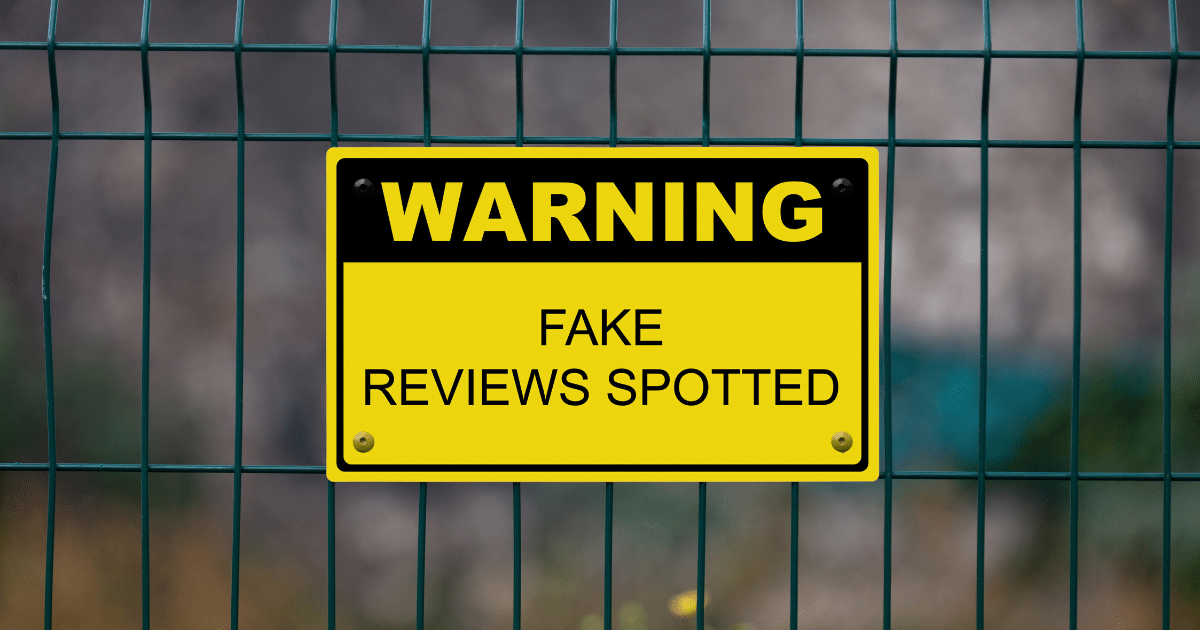Fake Supplement Reviews Still a Problem for the Industry
Navigating the world of supplements can feel like a minefield, especially when you can’t trust the reviews you’re reading. The Federal Trade Commission (FTC) recently highlighted this issue by cracking down on supplement companies for buying fake reviews for their products on Amazon.
One company was even hit with a significant fine for using a third-party website to generate bogus reviews, all to maintain a perfect five-star rating. This isn’t a new problem, but it’s a persistent one that directly impacts your health and your wallet.
As a certified sports nutritionist with over two decades in the fitness industry, I’ve seen firsthand how deceptive marketing can mislead people. This guide will give you the insider knowledge to see past the fake supplement reviews and make confident, informed choices about your health.
Disclaimer: This article is for informational purposes only and is not meant to treat or diagnose any condition. It is recommended that you speak with your doctor before starting any exercise program, changing your daily nutrition, or adding any supplements to your regimen.
Table of contents
Key Takeaways
- Fake Reviews Are Widespread: The Federal Trade Commission (FTC) is actively fining companies for buying fake reviews, proving this is a serious and ongoing issue.
- Look for Red Flags: Be cautious of overly positive, generic language and a sudden burst of reviews over a short period. These are common signs of manipulation.
- Trust Third-Party Verification: Don’t rely solely on store reviews. Prioritize supplements verified by independent organizations like NSF Certified for Sport or Informed-Sport.
- Use Analysis Tools: Free websites and browser extensions like Fakespot or ReviewMeta can analyze product review pages and flag suspicious activity, giving you a more accurate picture.
- Focus on the Label: The most reliable information is on the product itself. Look for transparent labels with clear dosages instead of vague “proprietary blends.”

What is a Fake Supplement Review?
A fake supplement review is any review that doesn’t come from a real customer’s genuine experience. Its goal is to mislead you and manipulate a product’s reputation. These deceptive reviews are more than just paid endorsements, they come in several sneaky forms.
Understanding the different types of fake reviews is the first step toward spotting them. They range from completely fabricated stories to subtle attacks on competitors.
- Fabricated Experiences: The reviewer invents a story about amazing results, like rapid weight loss or muscle gain, without ever using the product. A 2023 study found that reviews with emotional language are often perceived as more helpful, a tactic fake reviewers exploit.
- Paid or Incentivized Reviews: This is the most common type. Individuals are paid or given free products in exchange for a glowing review. The FTC’s 2023 crackdown on The Bountiful Company for using its own employees to post reviews on Amazon is a prime example of this.
- Competitor Attacks: A brand might pay people to leave negative one-star reviews on a competitor’s product to damage its sales and search ranking.
- Automated or “Bot” Reviews: Some companies use software to generate and post hundreds of generic, positive reviews. A key red flag is seeing many reviews posted on the exact same day with similar, vague phrasing.
- Review Hijacking: A deceptive seller finds an old, inactive product page with hundreds of positive reviews. They then change the product title, images, and description to their new supplement, inheriting all the old positive feedback.
- Excessive Marketing Language: Real customers usually talk about their specific experience. Fake reviews often read like advertisements, using brand slogans or overly promotional terms.
Why Would People Write Fake Supplement Reviews?

The motivation behind fake supplement reviews almost always boils down to money and manipulation. For a brand, a high star rating is one of the most powerful drivers of online sales and can make or break a product’s success.
Here are the primary reasons these deceptive practices continue to thrive in the sports nutrition landscape.
- Direct Financial Gain: More positive reviews lead to higher search rankings on sites like Amazon. This increased visibility translates directly into more sales and profit for the company.
- Competitive Sabotage: Some unethical companies try to gain a competitive edge by flooding a rival’s product page with negative reviews, hoping to drive their rating down and push customers away.
- Affiliate Marketing Commissions: Reviewers, especially on blogs or YouTube, may earn a commission when you buy a product through their link. This creates a financial incentive to praise a supplement, whether it’s effective or not.
- Brand Image Management: If a product receives legitimate negative feedback, a company might try to “drown it out” by purchasing a wave of fake five-star reviews to artificially inflate the overall rating.
- Boosting Search Engine Optimization (SEO): Positive product review signals can contribute to better rankings in Google search results, making the product more visible to potential customers.
What Goes on Behind Closed Doors with Fake Supplement Reviews
When online retailers started cracking down on fake reviews, unethical brands had to get more creative. Many sites, including Bodybuilding.com, implemented a “verified buyer” tag to show that the reviewer had actually purchased the product. Unfortunately, even this system was quickly exploited.
The workaround was simple but deceptive. Brands discovered they could get that coveted “verified buyer” tag by having someone purchase the product, write the review, and then get fully reimbursed.
A brand would contact a consumer and instruct them to buy a product. Once they received the shipping notification, which triggered the “verified buyer” status, they were told to post a glowing five-star review. In return, the company would refund the entire purchase and often send them extra free products for their trouble.
This scheme creates a review that looks completely legitimate to the average shopper but is entirely fraudulent. The reviewer has no financial risk and a strong incentive to write exactly what the company wants.
In my experience, this is one of the shadiest practices in the industry. Some brands even included clauses in their sponsored athlete contracts requiring them to post fake reviews, providing a script of exactly what to say. When these contracts surfaced on online forums, it exposed just how deep the deception could go.
What Does This All Mean?
It means you have to be your own advocate and approach supplement reviews with healthy skepticism. You can no longer take a high star rating at face value, because you don’t know the story behind those reviews. Were they from genuine customers, or were they paid for?

I don’t trust most online reviews for an initial product evaluation. Instead, I teach my clients to ignore the hype and go straight to the source: the supplement facts panel.
The product’s profile is far more important than what anonymous people on the internet say. A well-formulated product with transparent labeling speaks for itself. I’ve seen too many people waste money on highly-rated products that were ineffective simply because they trusted manipulated reviews over objective facts.
Look for these signs of a trustworthy product, which are much more reliable than reviews:
- Third-Party Testing Seals: Look for logos from organizations like NSF Certified for Sport or Informed-Sport. These verify that what’s on the label is actually in the bottle and that the product is free of banned substances.
- Transparent Labeling: Avoid “proprietary blends” that hide the exact amounts of each ingredient. Reputable brands will tell you precisely what you’re getting in each serving.
What Should You Do?
This information isn’t meant to scare you away from supplements. The health and fitness industry is filled with incredible, ethical brands dedicated to quality. The key is learning how to tell the good from the bad.
Instead of relying on reviews, become an educated consumer. Your best defense against deceptive marketing is knowledge. Here are actionable steps you can take to vet any supplement and protect yourself from fake reviews.
Your 5-Step Checklist for Vetting Supplements
- Analyze the Reviews with a Tool: Before you even read the reviews, copy the product page URL and paste it into a review analysis tool like Fakespot or ReviewMeta. These services use algorithms to detect suspicious patterns and give the reviews a more trustworthy grade.
- Read the 2, 3, and 4-Star Reviews: Five-star reviews can be fake, and one-star reviews can be from competitors. The most honest and balanced feedback is often found in the middle ratings.
- Check for Third-Party Certification: As I mentioned, this is a non-negotiable for me as a sports nutritionist. Look for seals from NSF, Informed-Sport, or USP on the product label. This is the single most reliable indicator of quality.
- Investigate the Brand’s Reputation: Do a quick search for the brand’s name outside of the store you’re on. Do they have a professional website? Are they active on social media? A complete lack of presence can be a red flag.
- Search Reddit for Unfiltered Opinions: For a dose of reality, search for the product name on Reddit. You’ll often find brutally honest discussions from real users in communities like r/Supplements, free from marketing spin.
FAQs About Supplement Reviews
Are fake reviews illegal?
Yes. The Federal Trade Commission (FTC) considers fake reviews a form of deceptive advertising. The Consumer Review Fairness Act of 2016 makes it illegal for companies to use clauses in contracts that prohibit customers from writing honest reviews. The FTC can and does issue large fines to companies caught buying or fabricating reviews.
How can I spot a fake review on Amazon?
Look for several red flags. Be wary of a large number of reviews posted in a very short time. Check the reviewer’s profile, if they only ever leave five-star reviews, that is suspicious. Generic, overly enthusiastic language that sounds like a marketing brochure is another major warning sign. Finally, filter to see “verified purchase” reviews, but remember even those can be manipulated.
What is more reliable than a product review?
Independent, third-party testing is the gold standard. Certifications from organizations like NSF Certified for Sport or Informed-Sport are far more reliable than any customer review. These seals verify product purity, potency, and safety. Additionally, look for analysis from independent experts in the fitness and health field who are not affiliated with the brand.


*Disclosure: This article may contain affiliate links or ads, which means we earn a small commission at no extra cost to you if you make a purchase through these links. These commissions help support the operation and maintenance of our website, allowing us to continue producing free valuable content. Your support is genuinely appreciated, whether you choose to use our links or not. Thank you for being a part of our community and enjoying our content.
PLEASE CONSIDER SHARING THIS ON YOUR SOCIAL MEDIA TO HELP OTHERS LEARN MORE ABOUT THIS TOPIC.





